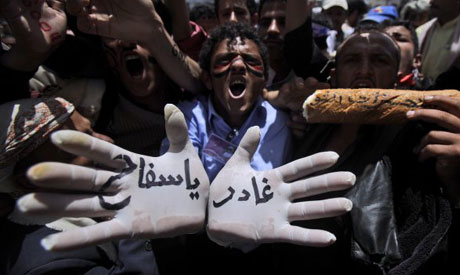
Anti-government protestors react during a demonstration demanding the resignation of Yemeni President Ali Abdullah Saleh, in Sanaa,Yemen, Saturday, Arabic reads "Leave murderer," (AP).
Police and armed men in civilian clothes opened fire on demonstrators in the Yemeni cities of Taiz and Hudaida on Monday as a drive to oust veteran President Ali Abdullah Saleh gathered pace, witnesses said.
In Taiz, south of the capital Sanaa, police mowed down protesters trying to storm the provincial government building, killing at least 12 people, and wounding 30 more by gunfire, hospital sources said.
In the Red Sea port of Hudaida, police and armed men in civilian clothes fired live rounds and teargas at hundreds of demonstrators marching on a presidential palace and some 50 people were wounded, another medical source said.
Negotiations for Saleh to hand over power appear to have stalled, prompting the escalating clashes and mounting pressure from the United States.
Sources close to the talks said Washington had given Saleh an ultimatum last week to agree on a deal negotiated by the U.S. ambassador in Sanaa to ensure a peaceful exit and transition of power, otherwise it would publicly call on him to step down.
The Obama administration has not so far made a public statement urging Saleh to stand aside. Such calls were key in bringing an end to the rule of Tunisia's Zine al-Abidine bin Ali and Egypt's Hosni Mubarak.
But the New York Times said on Monday that Washington "has now quietly shifted positions and has concluded that he is unlikely to bring about the required reforms and must be eased out of office".
Saleh, a perennial survivor, called on Sunday for an end to the violence, suggesting he had no intention of resigning soon.
"We call on the opposition coalition to end the crisis by ending sit-ins, blocking roads and assassinations, and they should end the state of rebellion in some military units," the president told visiting supporters from Taiz province on Sunday.
"We are ready to discuss transferring power, but in a peaceful and constitutional framework." His apparent stalling prompted new protests, including one in the middle of the night.
Demonstrators organised a 2 a.m. march on a presidential palace in Hudaida in protest at a security crackdown on rallies in Taiz on Sunday that doctors said killed two and wounded hundreds.
"They suddenly gathered around the province's administrative building and headed to the presidential palace, but police stopped them by firing gunshots in the air and using teargas. I saw a lot of plainclothes police attack them too," a witness in Hudaida told Reuters by phone.
The governor of Taiz later denied anyone had been killed there on Sunday and Saleh blamed the violence on the opposition.
Former Yemeni MP Mohammed Muqbil al-Hamiri, who had resigned from parliament in recent weeks, told Al Jazeera television by telephone that what was happening in Taiz was "a true massacre".
"The regime has surprised us with this extent of killing. I don't think the people will do anything other than come out with the bare chests to drain the government of all its ammunition," he said.
The ruling party said it had not received a proposed transition plan from opposition parties that envisages Saleh handing power to a vice-president while steps are taken towards creating a national unity government and calling new elections. "We haven't got it yet," an official said on Sunday.
Thousands or protesters have camped out around Sanaa University since early February, but in the past two weeks Saleh has begun mobilising his own supporters on the streets.
U.S. officials have talked publicly in recent weeks of their concern about who might succeed Saleh.
Washington fears Yemen could fragment along tribal and regional lines -- a spectre Saleh has raised in speeches -- and that this could allow al Qaeda in the Arabian Peninsula to stage more attacks outside Yemen.
Gulf Arab countries have resisted efforts by Sanaa to entice them into mediation and foreign ministers offered a vaguely worded comment on Yemen at a meeting in Riyadh on Sunday.
"On Yemen, there are some ideas that will be addressed to the Yemeni sides. I don't want to use the word mediation because now we are in a stage of feeling the pulse," UAE Foreign Minister Sheikh Abdullah bin Zayed al-Nahayan told reporters.
But with no sign of Saleh preparing to give up, protesters and opposition parties appear to be escalating their actions.
Many districts of the port city of Aden, seat of a separatist movement by southerners who say the 1994 unification of South Yemen with Saleh's north has left them marginalised, were deserted on Sunday in a campaign of civil disobedience.
Saleh has said he would be prepared to step down within a year after parliamentary and presidential elections and that an abrupt exit would cause chaos.
Under the opposition plan, the army and security forces would be restructured by a vice-president acting as temporary president, the opposition coalition said on Saturday. Wide discussions could then be held on constitutional changes, a unity government and new elections.
Talks have been off and on over the past two weeks, sometimes in the presence of the U.S. ambassador. Sources say Saleh wants to ensure he and his family do not face prosecution over corruption claims that the opposition has talked about.
The death of 52 protesters on March 18, apparently at the hands of government snipers, has been a turning point in the conflict. It led to a string of defections from Saleh's camp among diplomats, tribal leaders and key generals.
At least 84 people have died so far in the protests.
Short link: